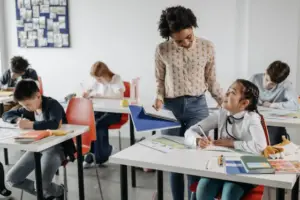Are you one of those who believes teaching is all about sitting in the classroom and writing lesson notes? This information contained in this article will give you a better understanding on the Roles of Teachers in a School.

Teachers play a crucial and collective role in a school setting, as they are responsible for shaping the minds and futures of their students. They fulfill numerous roles beyond simply impacting knowledge, and their contributions are vital for creating a positive and conducive learning environment.
In this article, we will be identifying some of the collective roles of teachers in a school [2].
9 Collective Roles of Teachers in a School
Delving in, here are the collective roles if teachers in a school:
1. Educators
One of the major roles of teachers is to educate their students. They do this by developing lesson plans, delivering lectures, starting engaging discussions, and providing guidance to help students acquire knowledge and develop essential skills. Teachers design and implement instructional strategies that capture the needs and abilities of individual learners, ensuring a comprehensive and effective learning experience.
2. Mentorship
Till date, my family do not have an idea of why I chose to study Agricultural Economics and Extension instead of Nursing Science. But here is what happened. While in Senior Secondary School, Agricultural science was one of my core subjects. So, one of the days in our Agric laboratory after lectures, our Agric master started a conversation. He wanted to know the courses we intended to study in the higher Institution. After everyone had mentioned theirs, it got to my turn and I sounded confused about what I wanted.
Then he asked, “so none of you want to be an Agricultural Economist or Extension Agent? ” That was our first time hearing it because the topic we studied was “Careers in Agriculture.”
After he had explained everything about the course, I picked interest and at any slight opportunity I would always ask more questions about the course.
When it was time to apply for Admission in the University, I included Agricultural Economics in my choice of courses and ended up studying the course. Forgive my lengthy story but I needed to tell it to drive a point on the role of teachers in school as Mentors.
Teachers often play the role of mentors and role models in schools. They provide guidance, support, and advice to help students navigate academic, personal, and career challenges. Teachers inspire and motivate students, instilling positive values, and modeling good behavior, integrity, and perseverance. They also help students develop their own strengths and interests, guiding them towards success.
My choice of course in the University was because of the advice and guidance I got from my Secondary School teacher. Wondering if I’m practicing what I studied? Well, No! Passion has a way of rearranging our plans.
3. Facilitators

Teachers play the role of facilitators by encouraging student engagement and fostering critical and analytical thinking. They create an environment that encourages student participation, asking thought-provoking questions, and guiding students to discover knowledge on their own rather than forcing them to accept just anything without having a say. By facilitating discussions and group activities, teachers promote collaboration, problem-solving, and the development of social skills.
4. Assessors and Evaluators
Teachers are responsible for assessing and evaluating the progress of their students. This is another collective role of teachers in schools. They design assessments, such as tests, and projects, to measure students’ understanding of things being taught. Through careful evaluation, teachers identify areas where students may need additional support or improvement. They provide constructive criticism, feedback, track student performance, and offer guidance for academic growth.
5. Counselors:
Ideally, every trained teacher is a counselor by default but not all counselors are teachers. Teachers often serve as informal counselors, providing emotional support and guidance to learners, whether at primary [1] or secondary school level . They create a safe and inclusive classroom environment where students feel comfortable discussing their challenges and seeking advice. Teachers may address personal issues, promote mental well-being, and refer students to specialized counseling services when needed. They play a crucial role in fostering positive mental health and resilience among students.
6. Collaborators

Ever wondered why some parents will turn to teachers when their children are behaving in certain ways when the reverse should be the case? Well, don’t overthink it. Some teachers actually know and understand some children more than their parents because they spend a good amount of time in school with their teachers too.
The fact is, both parents and teachers have a vital role to play in the successful upbringing of a child.
Teachers collaborate with colleagues, and parents to ensure students’ success. They participate in professional learning communities, sharing knowledge, experiences, and best practices with fellow educators. Collaboration allows teachers to enhance their teaching strategies, curriculum development, and classroom management techniques. Teachers also engage in parent-teacher conferences and meetings to establish effective communication channels and involve parents in their child’s education. This is why their role as collaborators can not be overemphasized.
7. Keeping Up with Evolving Learning Strategies

Teachers must consistently stay informed about the latest developments and changes in learning and education. The world is rapidly evolving, and teachers should not become complacent with their existing knowledge, even in their specialized subjects. The vast amount of information available on various subjects calls for continuous research and discovery.
Teachers need to avoid teaching outdated principles that are no longer relevant in today’s world. Engaging in ongoing research allows teachers to understand the ever-changing dynamics of the modern school environment. With this knowledge, they can effectively mentor and guide new teachers, equipping them to navigate today’s learning pattern. In other words, teachers play the role of researchers.
8. Curriculum Developers
Teachers contribute to the development and improvement of the school’s curriculum. They align their teaching plans with educational standards and goals, engaging teaching methods and resources. By identifying students’ needs and interests, teachers can adapt the curriculum to ensure students have enjoyable learning experiences. They stay updated with the latest educational trends and research to provide high-quality education.
9. Community Building
Teachers collectively participate in building a sense of community within the school and beyond. They organize and supervise extracurricular activities, clubs, and events that promote teamwork, leadership, and social skills. Teachers collaborate with organizations and invite guest speakers to expose students to diverse aspects for students’ holistic development.
Conclusion
In conclusion, the collective roles of teachers in a school come in different forms and are essential for creating a rich and supportive learning environment. Teachers not only serve as educators but also as facilitators, mentors, assessors, counselors, collaborators, curriculum developers, and community builders. They play a vital role in shaping the minds, character, and future success of their students.
Through their dedication, knowledge, and passion, teachers provide students with the necessary skills, knowledge, and guidance to thrive academically and personally. They inspire and motivate students, fostering a love for learning and encouraging critical thinking and problem-solving abilities. Teachers serve as positive role models, guiding students towards success and helping them develop into responsible and well-rounded individuals.
Moreover, teachers actively collaborate with colleagues, administrators, and parents to create a supportive network and ensure students’ success.
Overall, teachers are the pillars of a school, shaping the future generations and making a lasting impact on society. Their collective roles extend far beyond the classroom, as they contribute to the holistic development of students and prepare them to become useful citizens and lifelong learners. The invaluable contributions of teachers deserve recognition, appreciation, and support as they continue to shape the minds and futures of countless students.
Having seen the numerous collective roles of teachers in a school, do you still believe that their reward is in heaven? I don’t think so.
References
[1] “Primary School Teacher Responsibilities and Duties.” Great Sample Resume, 29 June 2016, https://www.greatsampleresume.com/job-responsibilities/teaching/primary-school-teacher.
[2] Indeed.com, https://www.indeed.com/hire/c/info/7-roles-of-a-teacher.
Don’t miss out on current updates, kindly like us on Facebook & follow us on Follow @EAfinder OR leave a comment below for further inquiries






